If you land on this page it means you are a developer who is aiming to start their journey in game development or a curious fellow who wants to what technologies are used to create such amazing games.
Don’t worry I am here to answer all of your queries so that the curious fellow can sleep easily and the developer can make his/her choice to pick best programming language for game development for the next project.
Ready to level up your game development skills?
Picture this: you’ve got an epic game idea swirling around in your head, but you’re missing one crucial element – the perfect coding technology to bring it to life. Don’t worry, I’ve got your back!
In this article, we’re going on a journey to uncover the ultimate programming languages to create games.
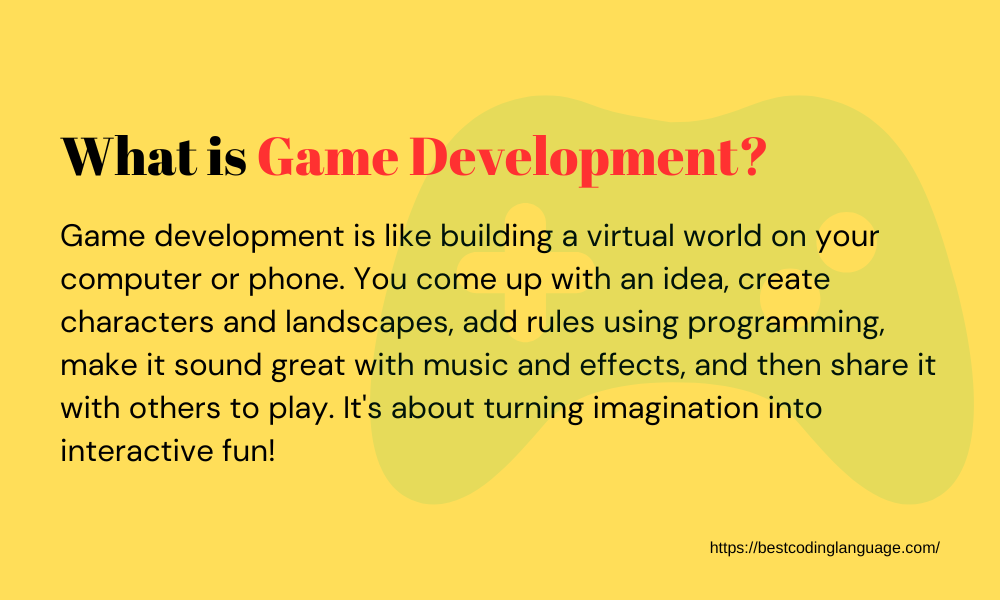
Top Choices for Game Development:
- Choose based on the game requirements: It depends on the type of game you are creating and its specific requirements.
- C++: Commonly used for developing high-performance games, offers greater control over hardware resources but has a steeper learning curve.
- Unity with C#: The Unity game engine along with C# scripting language is popular among developers for its ease of use and cross-platform capabilities. Widely used for creating both 2D and 3D games, offers a user-friendly interface and extensive built-in features.
- Unreal Engine: Known for high-quality graphics and powerful capabilities, suitable for creating advanced, visually stunning games.
- Java for Android games: If you are targeting Android platforms, Java is a good choice due to its compatibility and performance on the platform.
- JavaScript: Ideal for creating web-based games, offers compatibility across different platforms and easy integration with HTML5.
Factors to Consider When Choosing Language for Game Development
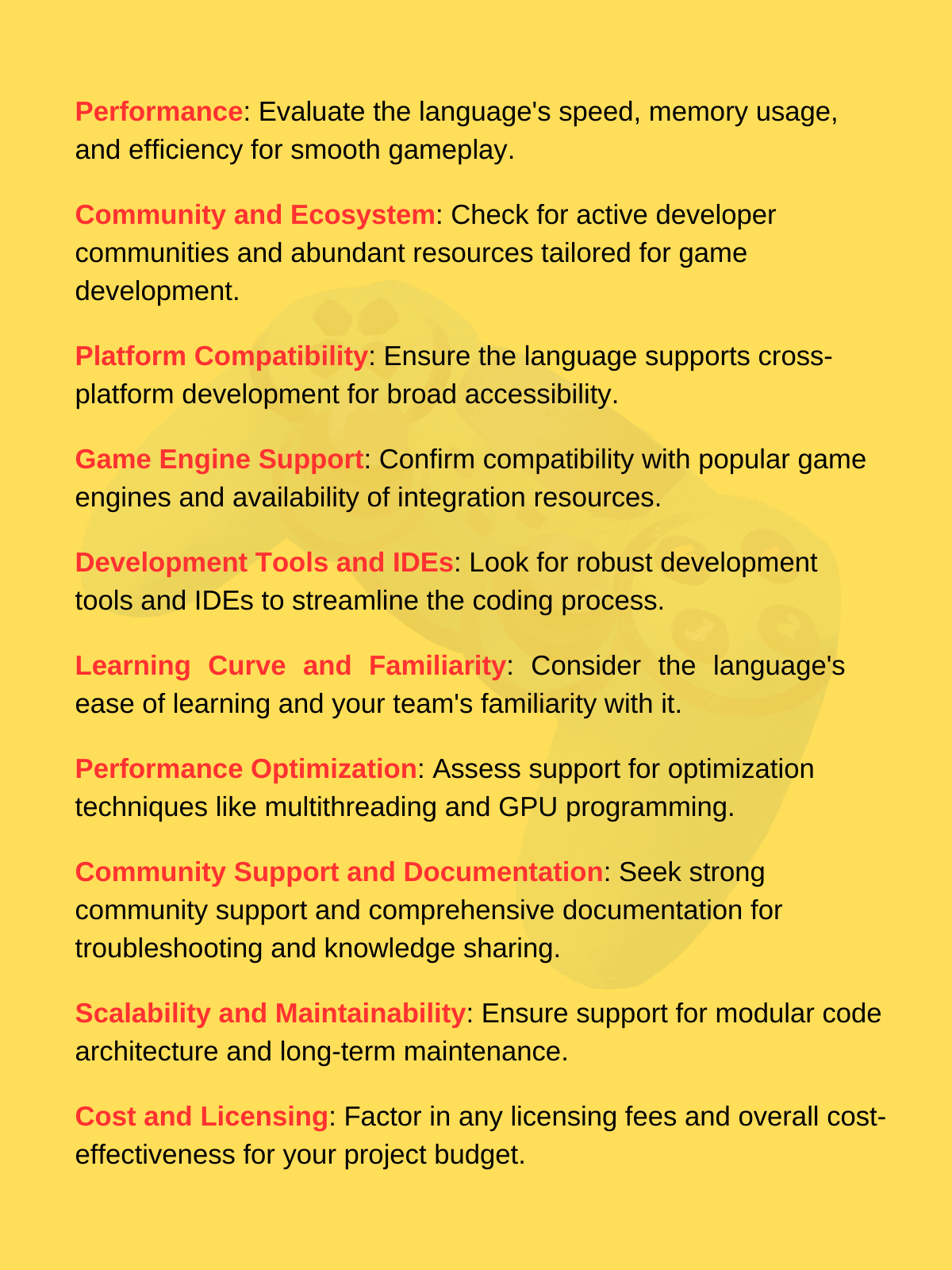
In-Depth Analysis of Popular Programming Languages for Game Development
1. C++
how and why C++ is by far the industry standard?
It is used directly or indirectly by all game engines including Unity. This is the reason why it is the top choice for game development. If you are an indie developer then you don’t need to work with C++ as long as you stick to what indie allows but what you are doing is scripting.
Let’s break down why C++ is a popular choice for game development, along with its pros and cons, as well as key features including game engines, popular games, and platforms:
Advantages:
- Performance: Known for its high performance and efficiency, making it ideal for resource-intensive game development tasks such as rendering graphics, physics simulations, and AI calculations.
- Control: Developers have low-level control over hardware resources, memory management, and optimization techniques, allowing for fine-tuning and optimization of game performance.
- Portability: Code can be compiled to run on multiple platforms, including Windows, macOS, Linux, consoles, and mobile devices, making it versatile for cross-platform game development.
- Access to APIs: Provides direct access to platform-specific APIs and hardware features, allowing developers to create custom game engines or integrate with existing ones for maximum flexibility.
- Community and Resources: Being one of the oldest and most widely used programming languages in game development, C++ boasts a large and active community of developers, along with abundant resources, libraries, and frameworks to support game development efforts.
Disadvantages:
- Steeper Learning Curve: Considered a complex language with a steep learning curve, especially for beginners. Mastery of C++ requires time, dedication, and a solid understanding of programming concepts.
- Memory Management: Requires manual memory management, which can lead to memory leaks, segmentation faults, and other memory-related issues if not handled properly by developers.
- Syntax Complexity: Syntax can be verbose and complex compared to higher-level languages, which may result in longer development cycles and increased potential for errors if not used carefully.
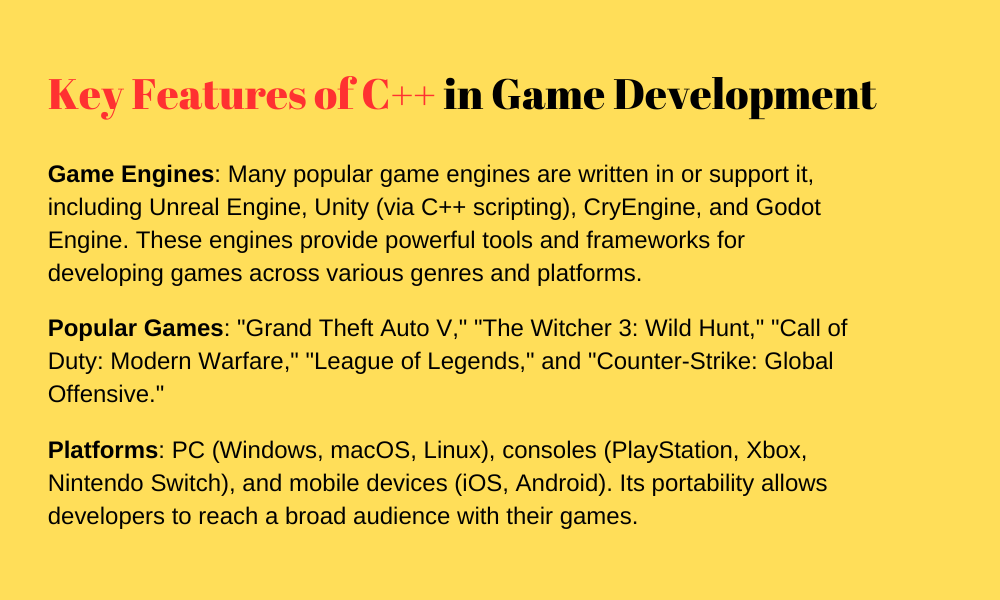
Using C++ in game development requires a deep understanding of the language and meticulous attention to detail. Developers must possess strong problem-solving skills and a solid grasp of software architecture to overcome the challenges.
2. C#
One of the primary reasons for C#’s popularity in game creation is its integration with Unity, a powerful game engine that supports cross-platform game development. Unity’s intuitive interface and extensive library of assets make it an ideal choice for both indie developers and AAA studios looking to create immersive gaming experiences.
Pros
- Ease of Learning: Known for its simplicity and readability, making it an excellent choice for beginners and experienced developers alike. Its syntax is similar to other high-level languages like Java and JavaScript, reducing the learning curve for new developers.
- Rapid Development: High-level language with built-in features like automatic memory management (garbage collection) and extensive standard libraries, allowing developers to write code more quickly and focus on game logic rather than low-level details.
- Unity Integration: Primary scripting language for the Unity game engine, one of the most popular and widely used engines in the industry. Unity’s robust development environment and extensive asset store make it easy to create games using C#.
- Cross-Platform Support: Games developed with Unity can be deployed to multiple platforms, including PC, consoles (PlayStation, Xbox), mobile devices (iOS, Android), and web browsers, allowing developers to reach a broad audience with their games.
Cons
- Performance: While it offers decent performance for most game genres, it may not be as efficient as lower-level languages like C++ for resource-intensive tasks such as real-time rendering, physics simulations, and AI calculations.
- Limited Low-Level Access: It is a managed language that runs on top of the .NET framework, which means developers have limited access to low-level system resources and hardware features compared to languages like C++.
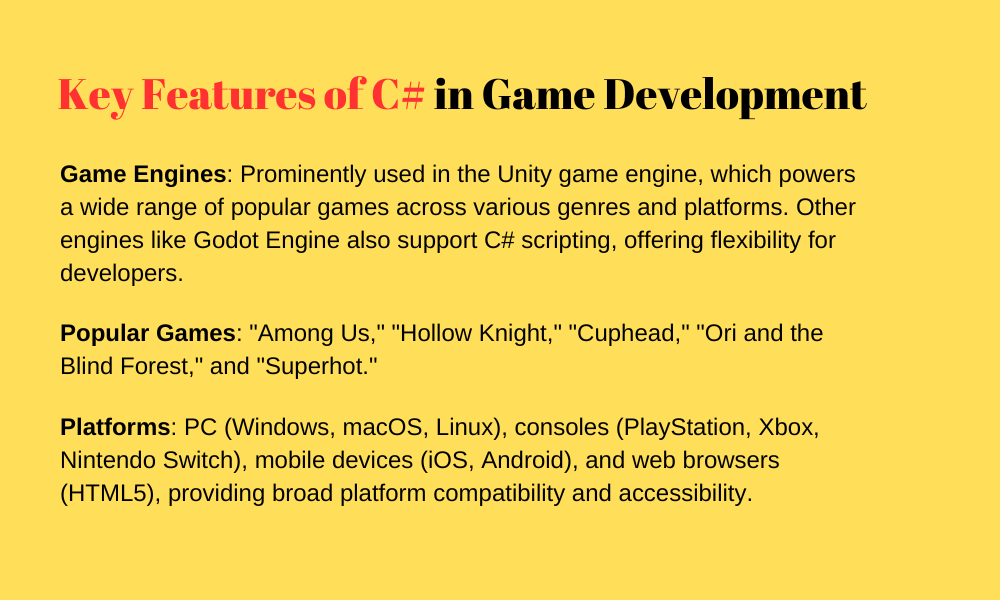
3. JavaScript
In recent years, JS has emerged as a versatile and powerful language for game development, offering developers a wide array of tools and frameworks to create engaging interactive experiences across various platforms.
Once it was primarily associated with web development, has now transcended its traditional boundaries to become a prominent player in the field. The versatility, ease of use, and vast ecosystem of libraries and frameworks have made it an attractive choice for developers looking to create games for web browsers, mobile devices, and even desktop platforms.
It is a strong contender for creating captivating games, along with its benefits, drawbacks, and key applications.
Pros:
- Cross-Platform Compatibility: Games can run on a wide range of platforms, including web browsers, mobile devices (iOS and Android), and desktop environments, thanks to its inherent compatibility and support.
- Ease of Learning and Accessibility: With its simple syntax and widespread adoption, JS is relatively easy to learn for beginners and offers a low barrier to entry for aspiring game developers.
- Vast Ecosystem of Libraries and Frameworks: Boasts a rich ecosystem of game development libraries and frameworks such as Phaser, Three.js, and Babylon.js, which provide developers with powerful tools for creating immersive gaming experiences.
- Rapid Prototyping and Iterative Development: The Dynamic nature and interpreted execution make it well-suited for rapid prototyping and iterative development, allowing developers to quickly test ideas and refine gameplay mechanics.
- Community Support and Resources: Its community is vibrant and active, with a wealth of tutorials, documentation, and online resources available to help developers overcome challenges and learn new skills.
Cons:
- Performance Limitations: While it has improved in terms of performance with advancements in browser technology and hardware acceleration, it may still lag behind native languages like C++ or Java, especially for graphics-intensive games.
- Security Concerns: As client-side code, JS is inherently exposed to potential security vulnerabilities such as cross-site scripting (XSS) attacks and code injection, necessitating careful attention to security best practices.
- Device and Browser Fragmentation: Ensuring consistent performance and compatibility across different devices and web browsers can be challenging due to fragmentation in the ecosystem.
- Limited Access to Hardware: The sandboxed environment restricts access to certain hardware features and system resources, which may limit the capabilities of games developed solely with JavaScript.
- Debugging and Optimization Challenges: Debugging complex codebases and optimizing performance can be time-consuming tasks, particularly for larger-scale game projects with intricate logic and graphics.
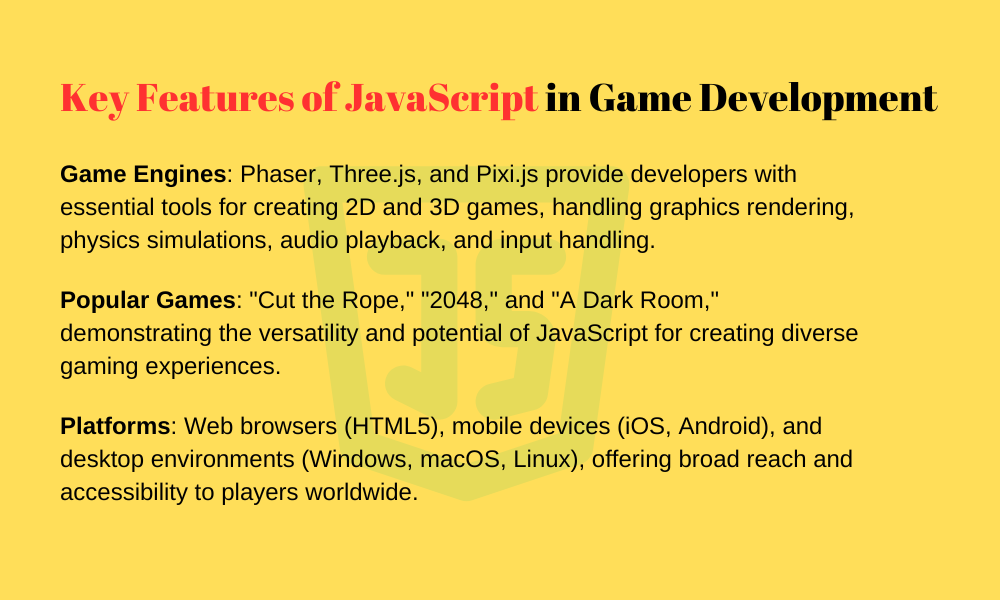
4. Java
Renowned for its versatility, scalability, and portability, has become a prominent player in the field of game development. Its rich set of libraries, extensive community support, and platform independence make it an ideal choice for developing games that can run seamlessly on desktop computers, mobile devices, and web browsers.
Pros
- Platform Independence: “write once, run anywhere” mantra allows games developed in Java to run on multiple platforms without requiring platform-specific modifications, thanks to its Java Virtual Machine (JVM) abstraction layer.
- Vast Ecosystem of Libraries and Frameworks: Boasts a rich ecosystem of game development libraries and frameworks such as LibGDX, LWJGL, and JavaFX, providing developers with powerful tools for creating 2D and 3D games.
- Strong Community Support: Developer community is vast and active, with abundant resources, tutorials, and forums available to help developers overcome challenges, share knowledge, and collaborate on game development projects.
- Performance and Scalability: Performance has significantly improved over the years, with advancements in virtual machine technology and hardware acceleration, making it suitable for developing graphically-rich and performance-intensive games.
- Integrated Development Environment (IDE) Support: Benefits from robust IDE support, with popular development environments such as IntelliJ IDEA, Eclipse, and NetBeans offering powerful features for code editing, debugging, and project management.
Cons
- Performance Overhead: While it’s performance has improved, it may still have higher overhead compared to lower-level languages like C++ or C#, particularly for graphics-intensive games requiring real-time rendering and complex physics simulations.
- Garbage Collection Issues: Automatic garbage collection mechanism can introduce occasional pauses or performance spikes, which may affect gameplay fluidity and responsiveness, especially in time-sensitive applications.
- Limited Access to Platform-Specific Features: Platform independence comes at the cost of limited access to certain platform-specific features and hardware optimizations, potentially limiting the capabilities of games developed in Java.
- Deployment and Distribution Complexity: Packaging and distributing Java games may require additional steps and dependencies, particularly for desktop applications, which may increase the complexity of the deployment process.
- Learning Curve: While its considered relatively easy to learn compared to lower-level languages, mastering game development concepts and best practices in Java may require time and dedication, especially for beginners.
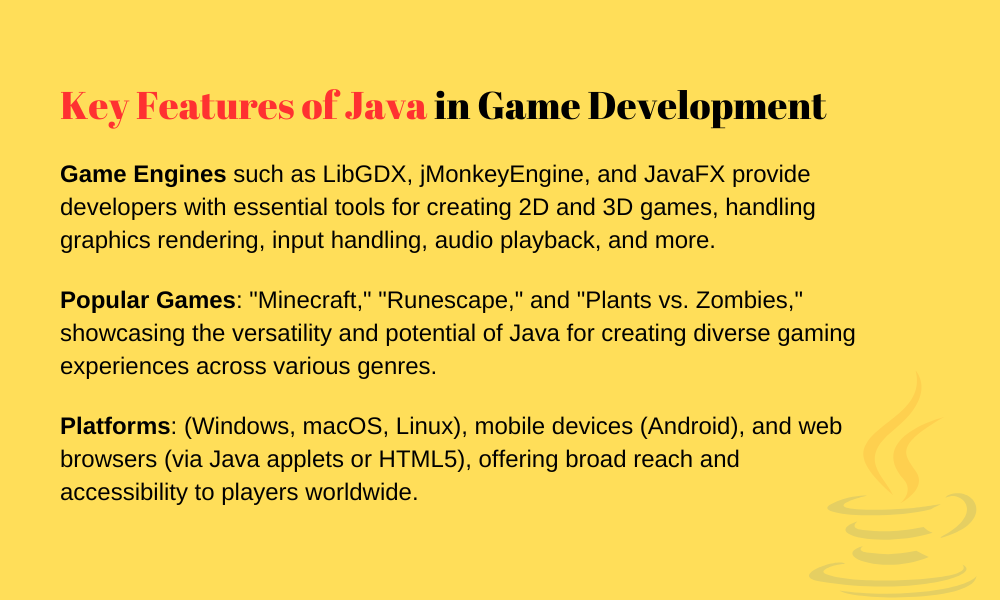
5. Swift
Offer developers a robust platform to create captivating gaming experiences for iOS, macOS, and beyond. Its modern syntax, performance, and integration with Apple’s ecosystem, has become a compelling choice for devs seeking to create immersive games for Apple devices. With its features and rich set of frameworks, Swift provides developers with the tools they need to create engaging games that push the boundaries of creativity and innovation.
Advantages
- Integration with Apple Ecosystem offer developers access to a wide range of APIs, frameworks, and tools for iOS, macOS, watchOS, and tvOS platforms.
- Modern Syntax and Readability make it easy for developers to write clean, concise code, reducing the likelihood of errors and enhancing productivity during the development process.
- High Performance rivals that of lower-level languages like C and C++, making it well-suited for developing graphically-rich and performance-intensive games that run smoothly on Apple devices.
- Safety and Security: The strong type system and memory safety features help prevent common programming errors and vulnerabilities, enhancing the reliability and security of game code.
- Playground Integration provide an interactive and immersive environment for experimenting with game ideas, prototyping gameplay mechanics, and learning Swift concepts in a fun and engaging manner.
Disadvantages
- Limited Cross-Platform Support: It is primarily designed for developing games on Apple platforms, which may limit the reach of games developed exclusively in Swift to iOS, macOS, and related devices.
- Learning Curve for New Developers: Modern syntax and readability may make it easier for experienced developers to learn, newcomers to game development may face a learning curve when familiarizing themselves with Swift and Apple’s development ecosystem.
- Dependency on Apple Ecosystem: Programmers may need to adhere to Apple’s guidelines, policies, and restrictions when developing and distributing games, which could impact creative freedom and flexibility.
- Potential for Code Obfuscation: It’s dynamic nature and reflection capabilities may present challenges for code obfuscation and intellectual property protection, particularly for developers concerned about piracy or reverse engineering.
- Device Fragmentation: While Swift games can run on various Apple devices, you may need to optimize their games for different screen sizes, resolutions, and hardware capabilities to ensure a consistent and enjoyable gaming experience across all supported devices.
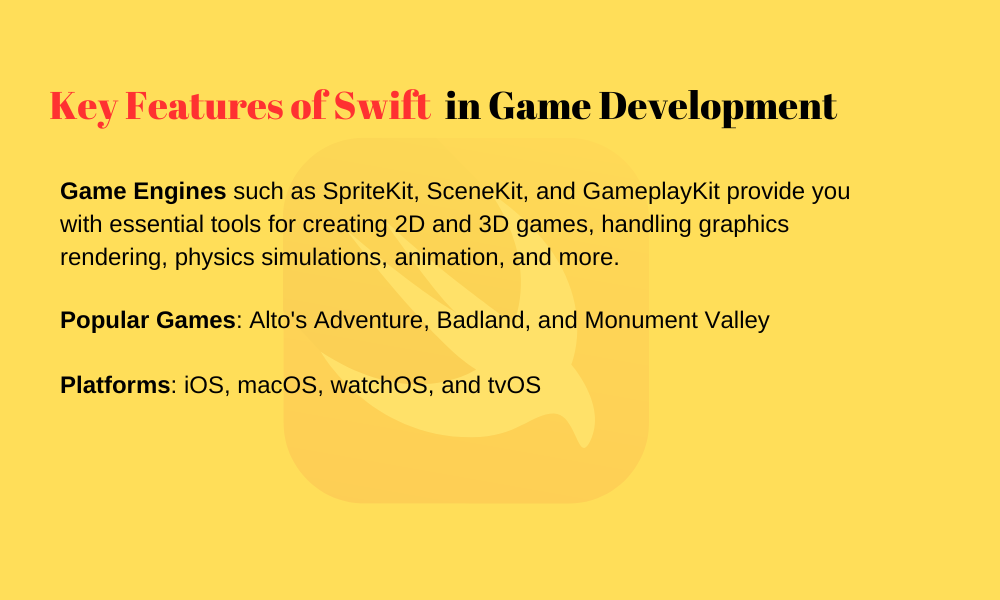
6. Lua
It has established itself as a lightweight and versatile scripting language. The simplicity, flexibility, and embeddability of Lua make it a popular choice for your gaming project with scripting capabilities. It provides us with a streamlined approach to adding dynamic behavior, AI logic, and game mechanics.
Advantages
- Simplicity and Ease of Learning makes it easy for developers of all skill levels to learn and use, reducing the barrier to entry for newcomers to game development.
- Flexibility and Embeddability within game engines and frameworks, allowing developers to extend and customize their games with scripted behavior and functionality.
- Performance: lightweight design and efficient execution make it well-suited for performance-sensitive applications, providing fast and responsive scripting capabilities without significant overhead.
- Community Support: Vibrant and active community, with abundant resources, tutorials, and libraries available to help you overcome challenges and optimize Lua scripts.
- Cross-Platform Compatibility: Can run on a wide range of platforms, including desktop computers, mobile devices, consoles, and embedded systems.
Disadvantages
- Limited Standard Library is relatively small compared to other programming languages, requiring developers to rely on third-party libraries or custom solutions for certain tasks such as networking, file I/O, and multimedia.
- Debugging and Error Handling capabilities may be less robust compared to other languages, making it challenging to diagnose and troubleshoot issues in complex Lua scripts.
- Performance Limitations for CPU-Intensive Tasks: Performs well for most scripting tasks, it may struggle with CPU-intensive operations or real-time processing, requiring careful optimization and profiling to maintain smooth gameplay performance.
- Memory Management: The garbage collection mechanism may introduce occasional performance hiccups or memory leaks in long-running applications, necessitating careful memory management practices in scripts.
- Integration with Native Code: Integrating Lua scripts with native code or existing game engines may require additional effort and expertise, particularly when dealing with performance-critical or platform-specific functionality.

7. Python
We all know Python is well known for its simplicity, readability, and vast ecosystem of libraries which is why it is one of the top choices for any type of project including game development. With its beginner-friendly syntax and powerful capabilities, it provides us with a flexible and expressive language to bring our game ideas to fruition.
Advantages
- Simplicity and Readability: Clean and intuitive syntax makes it easy for developers of all skill levels to write and understand code, reducing the learning curve and enabling rapid development.
- Vast Ecosystem of Libraries and frameworks such as Pygame, Panda3D, and Godot Engine provide game engineers with powerful tools for creating 2D and 3D games.
- Cross-Platform Compatibility: Python games can run on various platforms, including desktop computers (Windows, macOS, Linux), mobile devices (iOS, Android), and web browsers.
- Community Support: Benefits from a large and active community of developers, with abundant resources, tutorials, and forums available to help us overcome challenges and learn new skills.
- Integration with Other Technologies: Seamlessly integrates with other technologies and languages to leverage existing codebases, libraries, and tools to enhance workflow.
Disadvantages
- Performance: It may not perform as well as lower-level languages for highly performance-sensitive applications or graphics-intensive games.
- Dependency on External Libraries: Relies on third-party libraries and frameworks, which may introduce dependencies and compatibility issues, particularly when deploying games across different platforms.
- Limited Graphics Capabilities: Libraries like Pygame for 2D game development and Panda3D for 3D game development, its graphics capabilities may be more limited compared to dedicated game engines like Unity or Unreal Engine.
- Difficulty with Memory Management: Automatic memory management (garbage collection) may lead to occasional performance overhead or memory leaks in long-running applications, requiring software engineers to pay attention to memory usage and optimization.
- Learning Curve for Optimization: Optimizing code for performance may require additional effort and expertise because we need to implement efficient algorithms and data structures to overcome inherent performance limitations.
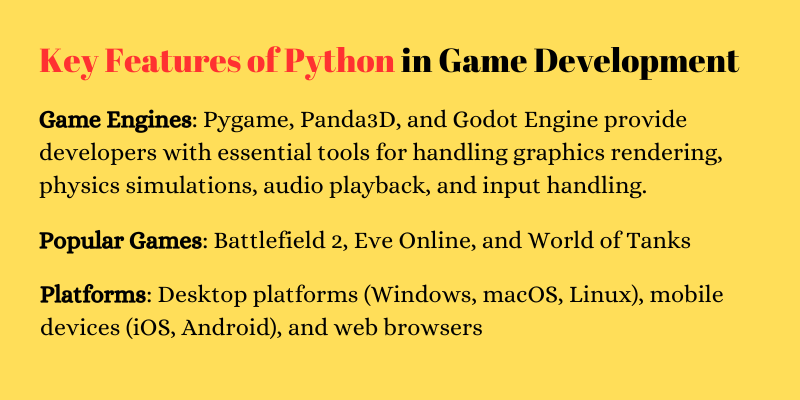
Keep Reading:
Frequently Asked Questions
What programming language should I learn for game development, wed and mobile app?
- Web Games: JavaScript
- Mobile Games: Java/Kotlin for Android game development. Swift/Objective-C for iOS game development. C#: Can also be used with game engines like Unity for cross-platform mobile game development.
What coding language should I use to design a video game, and what are some ways I can learn it?
To design a video game, choose a coding language based on your game type:
- C#: Unity for versatile game development.
- C++: Unreal Engine for high-performance games.
- JavaScript: Phaser.js for 2D web games, Three.js for 3D web games.
- Python: Godot Engine or Pygame for indie and prototype games.
Ways to learn:
- Online tutorials and courses (Udemy, Coursera).
- Documentation and guides provided by game engines.
- Books focusing on practical examples.
- YouTube tutorials (Brackeys, Unreal Engine).
- Online communities and forums (Reddit’s r/gamedev).
- Practice with small projects to gain experience.
What programming language is easy to learn and is good to use for games?
Python is easy to learn and suitable for game development, especially for beginners. It has libraries like Pygame for 2D games and Godot Engine for visual scripting.
Is making game a great way to learn programming for beginners?
From my personal experience YES, making games is a great way for beginners to learn programming. It’s engaging, practical, and fosters creativity while teaching fundamental programming concepts.
